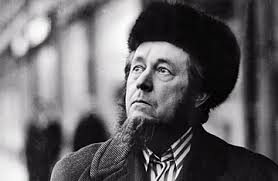Ricochet is the best place on the internet to discuss the issues of the day, either through commenting on posts or writing your own for our active and dynamic community in a fully moderated environment. In addition, the Ricochet Audio Network offers over 50 original podcasts with new episodes released every day.
 On Finishing The Gulag Archipelago
On Finishing The Gulag Archipelago
 I’ve been threatening to write a longish post on Alexander Solzhenitsyn (I’ve been reading books by him and about him for a year). And I still plan to do so.
I’ve been threatening to write a longish post on Alexander Solzhenitsyn (I’ve been reading books by him and about him for a year). And I still plan to do so.
But I could not help but share a couple of brief thoughts now. Last night, I finished Volume 3 of The Gulag Archipelago. It has been, at the same time, one of the most horrifying and edifying experiences of my life.
Horrifying in its seemingly endless recounting of venality, starvation, slave labor, cruelty, and death. (Estimates are dodgy, but it’s quite clear that between 5 million and 10 million men and women died in the Soviet slave labor camps: the Gulag Archipelago.)
Edifying because it demonstrates, yet again, the immense power (and humility) of one man driven by a holy duty to tell the story of the camps and help change history; the amazing adaptability of the human spirit to the most horrific conditions; and the many stories of faith and resiliency against an implacable foe (Stalin) and his evil minions.
The story of the writing and publication of this book is, itself, worthy of a book of its own. Suffice it say that Solzhenitsyn wrote it over a period of several years based on his own experiences and those of his fellow prisoners (mostly from their letters). He had to write it virtual secrecy, with bits and pieces of it hidden, or in the hands of trustworthy friends. Prior to its publication, Solzhenitsyn never had a complete manuscript of the entire book in his hands at a single time.
I could quote many things from the book, but the closing lines (written well after Stalin’s death) remind us that, (1) the Soviet system remained evil from beginning to end and, (2) why it is so important to live under a government of laws:
We called this chapter “The Law Today.” It should rightly be called “There is No Law.“
The same treacherous secrecy, the same fog of injustice, still hangs in our air, worse than the smoke of city chimneys.
For half a century and more the enormous state has towered over us, girded with hoops of steel. The hoops are still there. There is no law.
I fear that Solzhenitsyn’s memory is fading. We need to remind others of his greatness. God bless his enduring spirit.
Published in Literature, Religion & Philosophy



Afternoon Manny,
I think you might find “The First Circle” and “Cancer Ward” to have a pace you would like, the names of some of the characters might take a little work. The characters in these autobiographic novels come from all stations in life and Solzhenitsyn’s insight into to the nature of the human heart are for me unmatched. The Gulag is a catalog of amazing cruelty and stupidity. Prisoners are told to build a canal, the tools shovels and your hands will do, oh now that the canal is complete its not deep enough for any useful purpose. Prisoners are dropped off in the wilderness and told to build shelter, tools?, supplies? The stupidity of the state is so great one wonders how did the Soviet Union last as long as it did.
Hello Fritz,
As a curiosity Amalrik wrote “Will the Soviet Union Survive Until 1984”. Perhaps he knew the fragile nature of the state. He also wrote “Notes of a Revolutionary”; he appears to be a more aggressive critic than Solzhenitsyn, also he highlights the criminals who were the stooges and enforcers in the camps.
Thanks Jim.